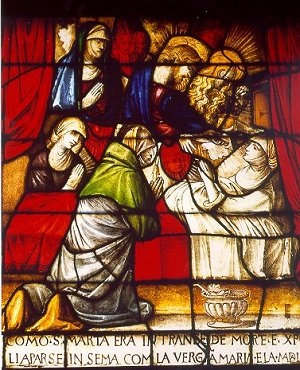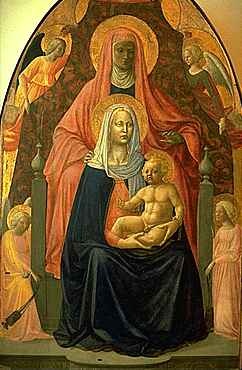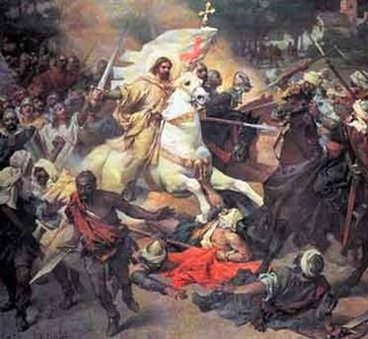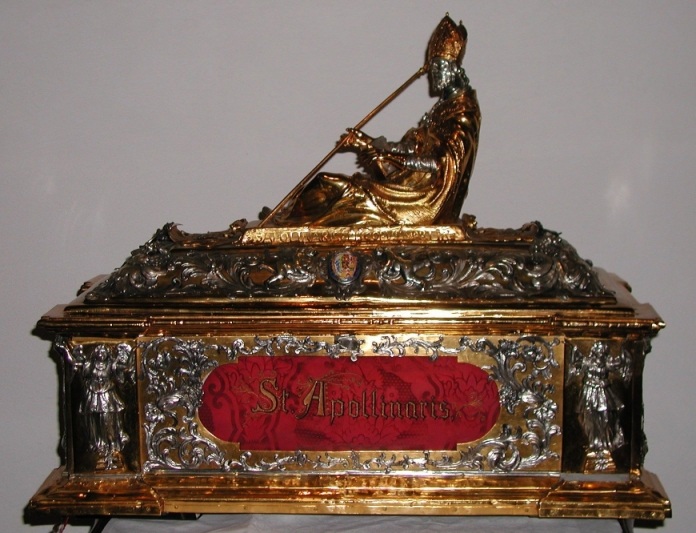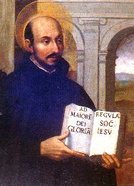
 Ignatius was a Spaniard by nation, and was born of the noble Biscayan family of Loyola. He followed first the Court and then the army of the Most Catholic King. At the siege of Pampeluna he received a severe wound which laid him up with a long and dangerous illness. During this time he chanced to read some godly books, and conceived from them a burning desire to follow in the footsteps of Christ and his Saints. He betook himself to Montserrat, and there entered himself for the heavenly warfare, by hanging up his weapons, and watching them for a night before the Altar of the Blessed Virgin. Thence he withdrew to Manresa, clad in sackcloth, for he had before given his costly raiment to a beggar. At Manresa he lived upon bread and water, begging the bread, and fasting every day except the Lord's Day.
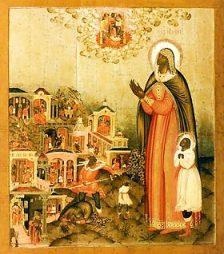 Butler's lives of the Saints St. Julitta, Martyr THE EMPEROR Dioclesian, by the first edicts which he issued out against the Christians in 303, declared them infamous, and debarred from all protection of the laws, and from all the privileges of citizens. By thus putting arms into the hands of every one against them, the tyrant hoped to see their very name extinguished; but he was not sensible that this divine religion then triumphs when its professors seem to be overcome by death, and that by it human weakness is made victorious over the power of the world and hell. Of this St. Julitta is an instance. She was a rich lady of Cæsarea, in Cappadocia, and was possessed of many farms, cattle, goods, and slaves. 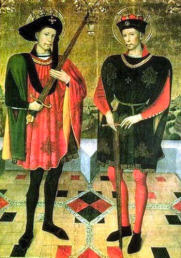 They were Persians, but coming to Rome, courageously confessed the faith of Christ in the persecution of Decius in 250. They were cruelly tormented, but the more their bodies were mangled and covered with ghastly wounds, the more were their souls adorned and beautified with divine grace, and rendered glorious in the sight of heaven. The Christians at Rome did not treat them as strangers, but as brethren united to them in the hope of the same blessed country; and after their death carefully deposited their bodies in the house of a subdeacon called Quirinus. In the reign of Constantine the Great, their relies were removed into the ancient burying place of Pontian, so called from some rich man who built it; called also, from some sign, Ad Ursum Pileatum. It afterward received its name from Saints Abdon and Sennen. It was situated near the Tiber, on the road to Porto, near the gates of Rome. The images of these martyrs with Persian bonnets and crowns on their heads and their names, are to be seen there at this day in ancient sculpture. Saints Abdon and Sennen are mentioned in the ancient Liberian Calendar. and in other Martyrologies though their modern Acts deserve no notice, as cardinal Norris has demonstrated. 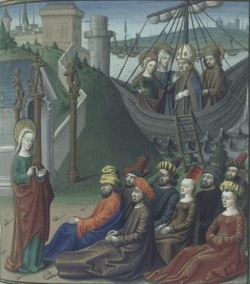 Martha was the daughter of noble and wealthy parents, but is best known as having been the hostess of the Lord Christ. After that he was ascended into heaven, Martha, along with her brother Lazarus, her sister Mary Magdalene, her waiting-woman Marcella, Maximin, who was one of the seventy-two disciples of the Lord Christ, and who had baptized the whole of the family, and many other Christians, was taken by the Jews, and turned adrift upon the open sea in a ship without sail or oars, to meet with certain wreck, but by the governance of God the ship came to land at Marseilles with all safe. Through the miracle and the preaching of the Saints, the people of Marseilles first, and then those of Aix, and of the uttermost tribes, believed in Christ, and Lazarus was made Bishop of Marseilles, and Maximin Bishop of Aix. Mary Magdalene sat still at Jesus' feet being altogether given to prayer and the contemplation of heavenly blessedness, that that good part which she had chosen might not be taken away from her, withdrew herself to a great cave in an exceeding high mountain, where she lived for thirty years, utterly cut off from all conversation with men, and every day during that time carried up by Angels into the air, to listen to them that dwell in heaven praising God. Martha, by the wondrous holiness and charity of her life, drew upon herself the love and wonder of all the inhabitants of Marseilles. She withdrew herself in company with some other honourable women into a place out of the way of men, where she lived long, with great praise for godliness and discretion. She foretold her own death long before, and at last, illustrious for miracles, passed away to be ever with the Lord, upon the 29th day of July. Her body is held in great worship at Tarascon. 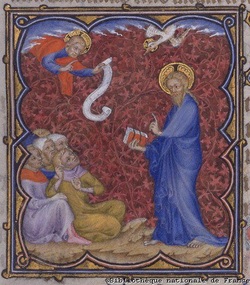 At that time: Jesus said to his disciples: Beware of false prophets which come to you in sheep's clothing, but inwardly they are ravening wolves. Sermon by St. Hilary the Bishop The Lord warneth us that we must rate the worth of flattering words and seeming meekness, by the fruits which they that manifest such things bring forth in their works; in other words, that we should look, in order to see what a man is, not at his professions, but at his deeds. For there are many whose sheep's clothing is but a disguise of wolfish ravening. And so the Lord asketh: Do men gather grapes of thorns, or figs of thistles? Even so every good tree bringeth forth good fruit, but a corrupt tree bringeth forth evil fruit. In which words the Lord teacheth us that men are a like case; evil men bring not forth good fruits, and hereby are we to know them. Lip-service alone winneth not the kingdom of heaven, nor is everyone that saith unto Christ, Lord, Lord, an heir thereof. What use is there in thus calling the Lord by his title Lord? Would he not be Lord of all the same, whether or not we called him so? What holiness is there in this ascription of a name, when the true way to enter into the kingdom of heaven is to do the will of our Father, who is in heaven? Saith the Lord Christ: Many will say to me in that day: Lord, Lord, have we not prophesied in thy Name? Already here doth the Lord rebuke the deceit of the false prophets, and the feigning of the hypocrites, who take glory to themselves because of the power of their words, or their prophesying in teaching, or their casting out of devils, or such-like mighty works. Because of all these things they promise unto themselves the kingdom of heaven, as though in their words and works any good thing were their own and not rather the mighty working of that God upon whom they call; for it is reading that bringeth knowledge of doctrine, and the Name of Christ that driveth out devils. That which is needed on our part to win that blessed eternity, that of our own which we must give, is to will to do right, to turn away from all evil. to obey with our whole heart the commandments laid on us from heaven, and so to become the friends of God. It should be ours, rather to do God's will, than to boast of God's power. And we must put off from us, and thrust away, such as are by their wicked works already estranged from his friendship. 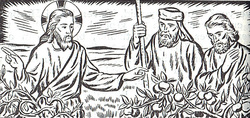 The Genuine Catholic ‘Not everyone who says to me, ‘Lord, Lord,’ shall enter the kingdom of heaven” (Matt., 7:21) The greatest privilege any human being could possess is to belong to the one true Church of Jesus Christ. This privilege means that one is united to Jesus Christ as a living member of the human body is united to the head. It means that one has infallible assurance that the doctrines he is receiving about God and the means to attain to eternal life are true. It means that one has at his disposal the most effective means of reaching the goal for which he was created, especially the sacraments of Penance and the Holy Eucharist. However, it may happen that a Catholic will come to believe that mere membership in the Church will save him, like fire insurance. This would be a grave error, as is evident from the words of Christ contained in today’s Gospel. He tells us that it is not sufficient that one acknowledge God as His Creator and Lord, but it is also necessary to obey all His commandments. “Not everyone who says to me, ‘Lord, Lord,’ shall enter the kingdom of heaven; but he who does the will of my Father in heaven shall enter the kingdom of heaven.” The person who is a Catholic only in name and profession is really more blameworthy than one who is separated from the Church and was never a Catholic. Often such a person is not responsible for his lack of membership in the Church. Perhaps he is not aware of many of the obligations imposed by God’s laws, so that some of his actions, reprehensible though they may be in themselves, are not deserving of blame in the sight of God. If he lives up to his duties as he honestly sees them in his own conscience, he is pleasing God and will be rewarded by Him. But the Catholic who boasts of his membership in the Church and yet does not live up to the principles of his faith is in a very unfortunate situation. He does not act in accordance with his belief. He believes that Our Lord is truly present in the Blessed Sacrament, yet he seldom receives Holy Communion well, with little preparation etc. He believes that the Church has received from Jesus Christ the authority to make laws, yet he frequently violates those laws. He believes that the priests of the Church have the power to forgive sins, yet he rarely goes to confession. He believes that the law of God commands him to be pure and temperate and honest, yet he does not hesitate to transgress these laws. He believes that if he prays in time of temptation he will receive the grace to conquer the temptation, yet he neglects to pray. Practical Application Are you among those who say, “Lord, Lord,” but do not fulfil the will of God? Are you a Catholic in name only? If so, you cannot regard yourself as a genuine Catholic or a loyal follower of Jesus Christ. 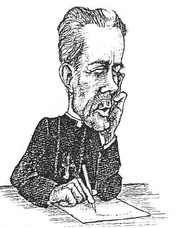 France Stirs Many of you know that on Tuesday and Wednesday of last week was held in the Dominican Friary of Avrillé close to Angers in North-west France a meeting of resistant priests from wherever the “Resistance” is up and running, but mainly from France. This was the third such meeting of French priests held in Avrillé since the beginning of the year, and it was the most important. This time they began to co-ordinate and to organize their activities in France, a country often decisive for the Church in various ways. The credit for calling these meetings goes to the Prior of Avrillé, Fr Pierre-Marie. For several years Avrillé has been offering support and a refuge to priests of the Society of St Pius X who have been finding their priestly life more and more difficult under its present leadership, whose pursuit of reconciliation with the Newchurch in Rome is, despite the disguise and denials, relentless. Only a few weeks ago the Society’s Second Assistant is reported to have said, “The train is leaving for Rome, and those who want to get off will get off.” For as long as possible Fr Pierre-Marie sought not to break off relations with the official SSPX, but earlier this year came the letter from Bishop Fellay finalising the rupture. That was inevitable, unless Avrillé would also betray Tradition. Originally Fr Pierre-Marie designed last week’s meeting for the French priests, but I suggested to him that resistant priests from outside France might also be invited for a double reason: the priests from outside would be encouraged to see the “Resistance” stirring in France, where it has stirred little – outwardly – up till now, and the French priests in turn might be reminded that there is not only France. Fr Pierre-Marie accepted my suggestion, and that is how it turned out, some 18 priests in all. The meeting went very well. There was little looking back and no bitterness, much looking forward. The first day’s business was largely for the French priests. They began by nominating as their co-ordinator Fr. de Mérode, a priest from Belgium with 30 years’ experience in the SSPX, all over the world. Then for their organisation being born they chose the name of “Priestly Union of Marcel Lefebvre,” a name that announces clearly the orientation. And finally Fr. De Mérode began organising a network of Mass centres all over France – back to the 1970’s, but in harsher conditions, and with very limited resources, at least for the moment. The second day’s business was given over to international concerns for the defence of the Faith, and here of course arose the question of episcopal consecrations, because I for one wished to know the mind of the priests present. It was relatively unanimous. Readers will be encouraged to know that while the priests thought that the time for consecrations had not yet come, nevertheless it could not be too far off. For indeed as of now it is very difficult to imagine any of the three bishops who remain within the SSPX undertaking to consecrate anybody without the approval of |Rome, and it is impossible to imagine neo-modernist Rome approving of any anti-modernist candidate! Patience. Do pray, both for the quiet success of the budding Priestly Union, and for God to give us, in his good time, the additional bishops needed for the defence of the Faith. Kyrie eleison. © 2011-2014 BRN Associates, Inc. All Rights Reserved.
A non-exclusive license to print out, forward by email, and/or post this article to the Internet is granted to users who wish to do so provided that no changes are made to the content so reproduced or distributed, to include the retention of this notice with any and all reproductions of content as authorized hereby. Aside from this limited, non-exclusive license, no portion of this article may be reproduced in any other form or by any other electronic or mechanical means without permission in writing from the publisher, except by a reviewer who may quote brief passages in a review, or except in cases where rights to content reproduced herein are retained by its original author(s) or other rights holder(s), and further reproduction is subject to permission otherwise granted thereby. Permissions inquiries should be directed to [email protected]. 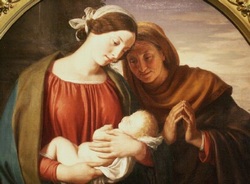 The Lesson is taken from a Sermon by St. John of Damascus The home of Anne is set before us, wherein to see an ensample both of married and of maiden life, the one in the person of the mother, the other in that of the daughter, whereof the one hath but now ceased to be barren, and the other is in a little while destined, beyond the course of nature, to become the Mother of the Messiah by a singular birth, specially designed by God to build up anew our nature. It is with reason then that Anne, filled with the Holy Ghost, with joyful and jubilant spirit singeth aloud: Rejoice with me, for out of my barren womb I have borne the bud of promise, and, as I have longed, I nourish at my breasts the fruit of benediction. I have laid aside the mournful garments of barrenness, and put on the joyful raiment of fruitfulness. Let Hannah the adversary of Peninnah make merry with me, and join with me for fellow-feeling, in singing of this new and unhoped-for wonder that is wrought in me. Let Sarah be glad that was joyfully pregnant in her old age, and was a shadow cast before of my conception that hitherto have been barren. Let all the barren and fruitless break forth into singing, when they behold in what wondrous wise I have been visited from heaven. Let all mothers likewise, that like Anne are gifted with fruitfulness, say: Blessed be he that gave their desire unto them that besought him, that gave fruitfulness unto her that was barren, and that granted unto her that from her should bud forth the joy-bringing Virgin, who, according to the flesh, was Mother of God, and whose womb was a heaven wherein he dwelt whom no place can contain. Let us also with them offer our praises to her that was called barren, but now is become the mother of a maid-child; let us say unto her in the words of Scripture: O how blessed is the house of David from whence thou art sprung, and from that womb wherein God hath fashioned the ark of his holiness, that is, her, by whom he was himself conceived without man's seed. Right blessed art thou and thrice blessed, whom God hath so blessed as to make thee to bring forth, as his own gift, the babe Mary, whose very name is highly honourable, out of whom Christ, the Flower of life, blossomed; a maiden whose rising is glorious, and whose delivery is worth more than the world. We also, O woman most blessed, do wish thee joy. In sooth thou hast brought forth what we have all hoped for, and God hath given us, namely, the babe of promise. Blessed indeed art thou, and blessed is the fruit of thy womb. The tongues of all the godly do magnify thine offspring, and every glad word is spoken concerning her of whom thou art delivered. Meet in truth is it, and most meet to praise her who received a revelation from the goodness of God, and bore for us such and so great a fruit, from whom sweet Jesus sprang. 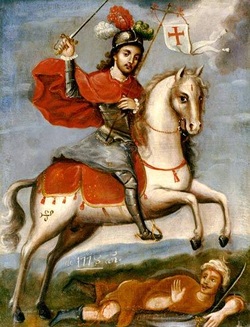 James, the Son of Zebedee and brother of the Apostle John, was a Galilean, and with his brother one of the first of his Apostles whom the Lord called, whileas they were in a ship with Zebedee their father, mending their nets―and immediately left the ship, and their father, and followed him. And he surnamed them Boanerges, which is, The sons of thunder. Peter, and James, and John, were the three Apostles whom the Saviour loved best; them he took and brought up into a high mountain apart and was transfigured before them; when he went to the house of the ruler of the synagogue to raise his daughter from the dead, he suffered no man to follow him save Peter, and James, and John; and at the last, just before the Jews took him, when he cometh unto a place called Gethsemane. After that Jesus Christ was ascended into heaven, James preached how that he was God, and led many in Judea and Samaria to the Christian Faith. A while afterward, he went to Spain, and there he brought some to Christ, of whom seven were afterwards ordained Bishops by Blessed Peter, and were the first such sent into that country. From Spain, James went back to Jerusalem, where he taught the Faith to divers persons, and, among others to the Magian Hermogenes. Thereupon Herod Agrippa, who had been raised to the kingdom under the Emperor Claudius, to curry favour with the Jews, condemned James to death for his firm confession that Jesus Christ is God. The officer who led James to the judgment-seat, at sight of the courage wherewith he was ready to offer up his testimony, declared himself also to be a Christian. As they were being hurried to execution, this man asked pardon of James, and the Apostle kissed him, saying, Peace be unto thee. James healed a paralytic, and immediately afterwards both the prisoners were beheaded. The body of the Apostle was afterwards taken to Compostela, where his grave is very famous. Multitudes of pilgrims from all parts of the earth betake themselves thither to pray, out of sheer piety or in fulfillment of vows. The birthday of James is kept by the Church upon this day, which is that of the translation of his body to Compostela. It was about Easter-time that he bare witness to Jesus Christ with his blood, at Jerusalem, being the first of the Apostles so to do. 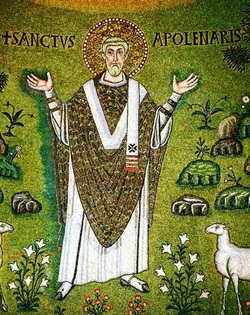 Apollinaris came from Antioch to Rome with the Prince of the Apostles, and was by him ordained a Bishop, and sent to Ravenna to preach the Gospel of the Lord Christ. He had already converted a great number of persons to the Christian Faith, when the idolatrous priests caught him and gave him a sharp flogging. A second riot was got up against him on account of one Boniface, a nobleman who had long been dumb, speaking, and his daughter being delivered from an unclean spirit. On this occasion Apollinaris was flogged again, and made to walk barefoot over hot embers. The fire did him no harm, and he was expelled from the city. Apollinaris lay hid for a while with certain Christians. Thence he went to Emília, where he restored to life the dead daughter of the Patrician Rufinus, so that the whole household of Rufinus might believe in Jesus Christ. This affair greatly incensed the Prefect, who sent for Apollinaris, and earnestly dealt with him to induce him to cease spreading the Christian Faith in that city. As Apollinaris paid no heed to the Prefect's orders, he was tortured on the rack, boiling water poured on his wounds, and his mouth bruised with a stone, after which he was ironed and cast into prison. On the fourth day he was put on board a ship and sent into banishment. The ship was wrecked, and he so came to Mysia, thence to the shores of the Danube, and afterwards into Thrace. However, the devil in the temple of Serapis declared that he could not give oracles, while the disciple of the Apostle Peter abode in these parts, and after a long search Apollinaris was found and commanded again to take ship. Thus he went back to Ravenna, where he was denounced by the same idolatrous priests as before, and given into the keeping of a centurion. This centurion was a secret worshipper of Christ, and in the night he let Apollinaris go. When it became known some of the officers of justice followed him, caught him on the road, beat him till they thought he was dead, and left him. Some Christians took him up, but on the seventh day, still exhorting them to stand firm in the Faith, he departed this life with the glorious splendour of martyrdom. His body was buried hard by the wall of the city. |
Archives
December 2014
Categories
All
While Archbishop Lefebvre Blog is provided free of charge, there are administrative and technical costs associated with making it available to subscribers worldwide and with operating this site. Contributions to offset these costs are appreciated, and may be made via the button below
|
